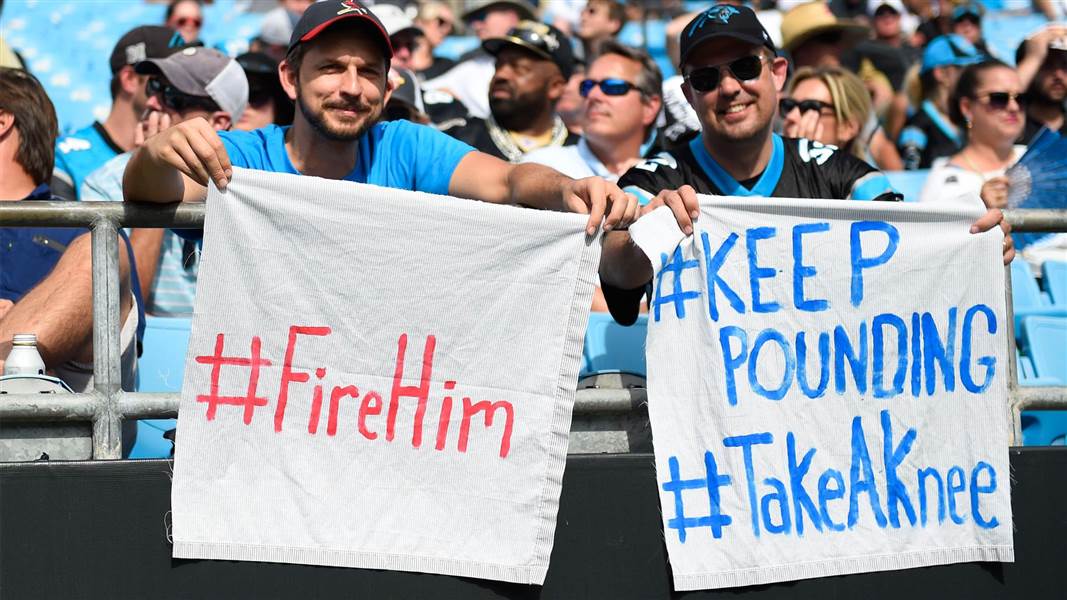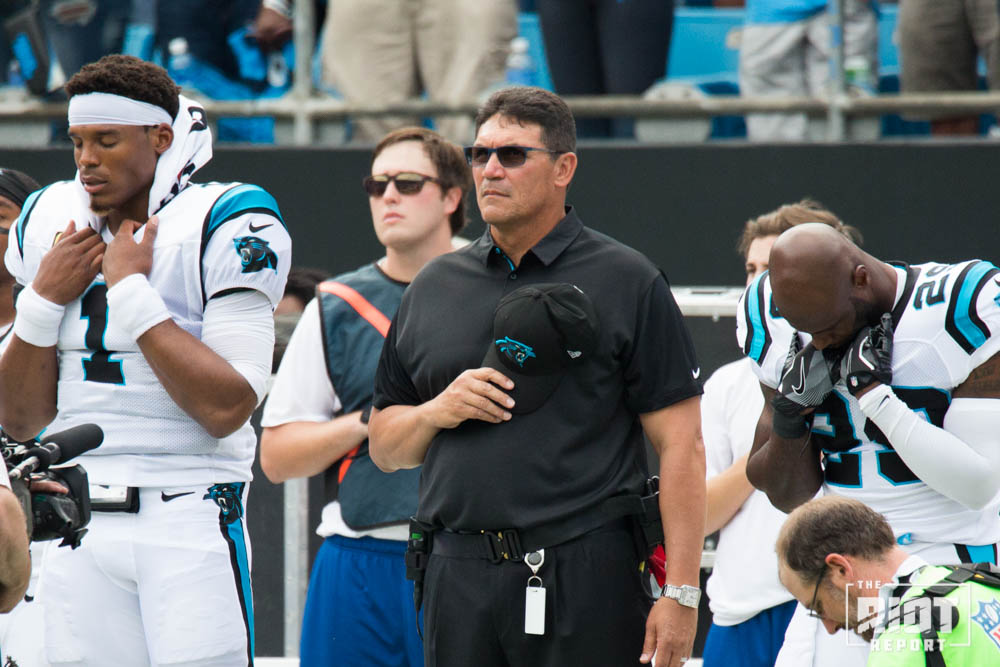It took nearly a month before Colin Kaepernick’s sitting for the national anthem was noticed.
When the then 29 year old quarterback addressed the media for nearly twenty minutes on that night, he admitted he didn’t expect it to blow up the way it had. He was glad it did, but acknowledged it was a personal statement, not a call to action; soon, after discussing it with former longsnapper and Green Beret Nate Boyer, he began kneeling as a more respectful form of protest and it did become a call to action – soon after that, the image of an athlete kneeling during their county’s own national anthem became one of the most powerful displays of protest in recent memory. The unwillingness to continue to accept the status quo crossed races, genders, sports and generations.
Or at least, that’s how it started. Then a man with a larger platform decided to get involved, because yes, some things are bigger than football. Kneeling players went from protesting to showing solidarity. People were taking kneeling selfies across the globe. Statements were being parsed and tallied – when Jerry Jones and all of the Dallas Cowboys kneeled in prime time, it became whatever that was – the discussion had drifted far from the intended target of police brutality against men and women of color in this country.
In this most recent wave of coverage, media members aren’t discussing the rule change, they’re using it as a fulcrum to decry bigger issues. The elimination of a major distraction for the NFL, their fans, partners, advertisers, etc. isn’t an attempt to silence voices in this country, it’s an attempt to get away from a situation the NFL can’t win. When the NFL pledged at least $89 million to social justice causes, it acknowledged the validity of the players’ protests. A quarter of the money is earmarked for the United Negro College Fund, and half of the money will be controlled by the Players Coalition, led by former Walter Payton Man of the Year Award winner Anquan Boldin and the Eagles’ Malcolm Jenkins.
Neither that position nor his on-field job stopped Jenkins from writing a passionate post disagreeing with the NFL’s decision. He sees the move as ignoring the reasons behind the protest and states that “what NFL owners did today was thwart the players’ constitutional rights to express themselves and use our platform to draw attention to social injustices like racial inequality in our country.”
In the last several years, domestic violence, racial inequality, drug use, sexual assault, concussions, CTE, murder, murder-suicide, power imbalance, and now disrespecting the American flag are all topics the NFL has used as the clarifying lens through which we see our fellow fans, communities, leaders and our country, for better or worse. It makes the product less fun. It takes away from the experience.
And for the NFL, it’s bad for business.

Photo Credit: NBC News
The NFL doesn’t want their players out of the social justice movement, they want their game devoid of anthem protests. And while Malcolm Jenkins reinforced the refrain that this isn’t about the anthem or the flag, media outlets disagree. For the league that never sleeps, it’s as though time has stood still since the announcement was made on Wednesday. A screenshot taken almost two days after the announcement (11:30 Thursday night) show all front page articles featuring the word ‘anthem’ – and that, unfortunately, is where we’re at. Players, tweeters, writers and talking heads continue to opine that ‘the flag isn’t what the protest is about’. Except it is now, because the President of the United States said the sons of bitches were disrespecting the flag. In doing so, he hijacked the protest.
Colin Kaepernick and the players lost the brand war – they never had a chance. The act of kneeling during the anthem’s meaning was twisted, permanently, on that night and in the ensuing deluge of discussion. The only constant: the NFL was the loser.
Because the protest itself was taken, that doesn’t mean progress stops. Jenkins would continue in his post: “The national conversation around race in America that NFL players forced over the past two years will persist as we continue to use our voices, our time and our money to create a more fair and just criminal justice system, and police brutality and foster better educational and economic opportunities for communities of color and those struggling in this country.”
Jenkins point on the NFL players forcing this discussion shouldn’t be overlooked. Right now the NBA, which has long mandated their players stand for the anthem, has become a bit of a media darling; despite the outward protests and statements by players, in a league and with a fan base that has largely accepted social statements by players as part of the game, none have resonated anywhere close to Kaepernick’s. The protest needed to be difficult for it to be meaningful.
Jenkins says that the protest “has never been about taking a knee, raising a fist or anyone’s patriotism but doing what we can to affect real change for real people.”
If it wasn’t about those things then, what is it about now?

